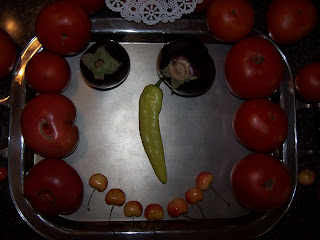I have wept over the losses my friends and total strangers have suffered this past week, some of them gone from this earth forever. One thought came to mind continuously: why them and not me? Why all those beautiful trees swept away and not mine? Why those quaint little towns and homes, churches and businesses worked for sometimes for years and not ours? Why those children, husbands, fathers, mothers and grandmothers and grandfathers taken and not me and mine? I do not have a rational answer to these questions. I would like to think it is because somehow I deserve God's favor, but, with David, "My sin(s) (are) ever before my face." There must be other reasons that I can't comprehend.
Noah was righteous in the sight of God and God spared him and his family while destroying the rest of the world. I, however, sense my unrighteousness keenly. I love the Lord, but often my priorities become skewed and my conscience seared concerning areas of my life that I should address but tend to ignore.
I am undeserving of God's mercy; and yet last week, He chose to take some of His children home to glory and leave me, a poor, struggling sinner, here for a while.
 |
| "The Deluge," by artist Francis Danby c. 1837 |
Here are some thoughts that have come to me from all of this:
My first thought is this: Like many of the folks who died during these tornadoes I may not have any warning when God takes me from this life. God may choose to take me out of this life with a fraction of a second to cry out to Him or say good-bye to loved ones or I may have no warning at all. Therefore, I must strive with all my being to live like someone who expects to die. Not living with dread and fear of death in some sort of morbid premonition that the sword hanging over my head is about to fall any second; but rather in a way that looks death in the face without fear because of Christ’s salvation, saying with the poet John Donne, "Death, be not proud...for, death, thou shalt die." The only way to live like this is to keep short accounts with sin and with our brothers and sisters, confessing our faults quickly and thoroughly, asking forgiveness sincerely and striving to mend broken relationships. Joe likes to quote someone as saying, "Live in such a way that when you die, that's all you have left to do," living in such a way that you have no regrets at the end of life.
 |
| "Subsiding Waters of the Deluge," by Thomas Cole 1829 |
 |
| my eighth grandbaby sleeping on her mama |
 |
| Joe and Honor Phillips at Kilmartin graveyard in Scotland |
Questions will come. We are created in the image of God Who is a personal being. Although He does not have a body or parts and emotions like His creatures, we are like Him in that we are personal, relational beings. We love to be loved. We crave interaction with Him and with other men and women. We glory in the work of our hands because God also loved His creation. When people we love or our works are destroyed, we grieve and suffer. The Bible recognizes this reaction as a natural one. We are told to “Rejoice with those who rejoice and grieve with those who grieve.” The Bible is full of many instances of those whose lives were devastated by loss, Job being a primary example. During these hard times, times of crisis, how do we handle the questions that come? When I have doubts and questions, griefs and sorrows, here’s what I ask God to help me do:
I try to focus my mind on what I know to be true about God, especially during times of crisis.
What do I know?
1. I know that the God Who planned and carried out the redemption of His elect through the death and resurrection of His only Son has a perfect plan for my life and the lives of all His creatures. All my days were planned out for me before I was created. Neither I nor any other person can lengthen or shorten my life. I am safe in the hollow of His hand. Psalm 139:16
2. I know that nothing can thwart God’s plan. No one, not the most sinful man who has ever lived, not even Satan himself, can cause anything to go wrong in God’s universe, for God is in control. He is the one true and living God, sovereign over all His creation, the God of providence Who is able to deliver His people from their enemies. No man can stay His hand from doing all His holy will. Psalm 45:5f
I can only see the immediate scene, the winds and the waves that cause me to fear. Despite my brave determination, when I start to sink beneath the sea of my sorrow and doubts, Christ Himself comes to me, through His powerful Word and Spirit, and brings me up out of the waves. I cannot walk on water. I cannot calm the storms of this life, but Christ Jesus my Savior can. Psalm 138:7
Augustine said: “I toss upon the waves; but Thou dost steer – Thou Who standeth at the helm of all things Thou hast made.”
3. I know that God is working all these things together for our ultimate good and His glory as He said He would. Rom. 8:28
4. I know that God made me to live faithfully in the light of what I know to be true, trusting Him for each day's strength and looking to Jesus, the Author and Finisher of my faith, to carry me through to the end of life, singing "Amazing Grace," and "Great is Thy Faithfulness," though death is staring me in the face.
5. I know I can trust Him, even in the dark.
Knowing all these things, I will not fear but trust the One Who knows the exact number of breaths I will take because He has mapped out my life for me.
 |
| -- in the ruins of St. Andrews Cathedral, Scotland |





























